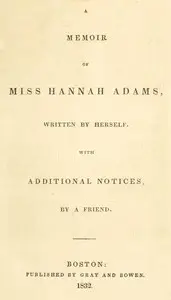"Memoirs of Doctor Burney (Vol. 1 of 3)" by Fanny Burney is a window into the life of a remarkable 18th-century musician, Dr. Charles Burney, told by his devoted daughter. The memoir recounts Dr. Burney’s journey from his humble birth in Shrewsbury in 1726 to his rise as a celebrated musicologist, painting a picture of his character, ambitions, and the world he inhabited. It follows both musical triumphs and personal struggles, including important figures such as Dr. Arne, and portrays his education and artistic endeavors in a society steeped in tradition. The memoirs convey a blend of personal stories and historical context, to ensure the preservation of his father's contributions and the remarkable figures that influenced his career and life.

Memoirs of Doctor Burney (Vol. 1 of 3) Arranged from his own manuscripts, from family papers, and from personal recollections by his daughter, Madame d'Arblay
By Fanny Burney
Witness the inspiring ascent of a young boy from a quiet village as he navigates the highs and lows of becoming a musical sensation in a world of artistic brilliance and societal expectations.
Summary
About the AuthorFrances Burney, also known as Fanny Burney and later Madame d'Arblay, was an English satirical novelist, diarist and playwright. In 1786–1790 she held the post of "Keeper of the Robes" to Charlotte of Mecklenburg-Strelitz, George III's queen. In 1793, aged 41, she married a French exile, General Alexandre d'Arblay. After a long writing career and wartime travels that stranded her in France for over a decade, she settled in Bath, England, where she died on 6 January 1840. The first of her four novels, Evelina (1778), was the most successful and remains her most highly regarded, followed by Cecilia (1782). Most of her stage plays were not performed in her lifetime. She wrote a memoir of her father (1832) and many letters and journals that have been gradually published since 1889, forty-nine years after her death.
Frances Burney, also known as Fanny Burney and later Madame d'Arblay, was an English satirical novelist, diarist and playwright. In 1786–1790 she held the post of "Keeper of the Robes" to Charlotte of Mecklenburg-Strelitz, George III's queen. In 1793, aged 41, she married a French exile, General Alexandre d'Arblay. After a long writing career and wartime travels that stranded her in France for over a decade, she settled in Bath, England, where she died on 6 January 1840. The first of her four novels, Evelina (1778), was the most successful and remains her most highly regarded, followed by Cecilia (1782). Most of her stage plays were not performed in her lifetime. She wrote a memoir of her father (1832) and many letters and journals that have been gradually published since 1889, forty-nine years after her death.

















